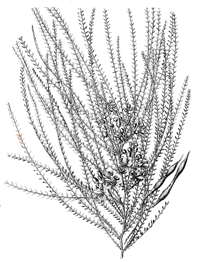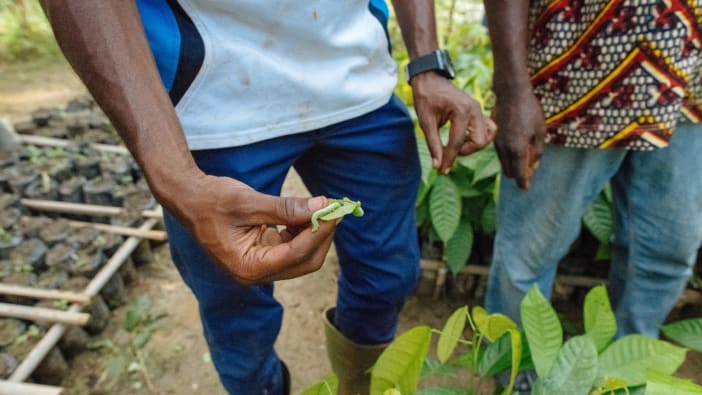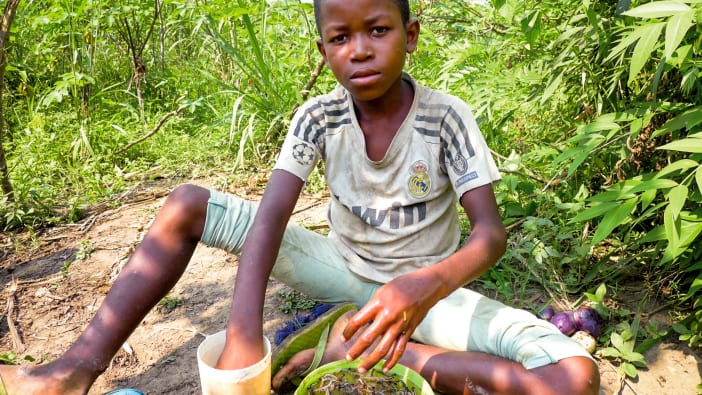
Articles
Parkinsonia aculeata
This multipurpose tree comes from the Americas but has been introduced throughout the tropics because of its many uses
1996 Available in French, English, Spanish and Portuguese

From: Participatory learning and action – Footsteps 29
How to ensure everyone has the opportunity to contribute to local decisions

This multipurpose tree comes from the Americas, but has been introduced throughout the tropics because of its many uses. It grows well in drier areas and will cope with poor or salty soils, occasional frost, low rainfall and long dry seasons. It is also known as Jerusalem thorn, Mexican palo verde or simply Parkinsonia.
It is an attractive tree to look at, with a green trunk, unusual leaves and bright yellow flowers. Parkinsonia is often grown as an ornamental tree but it has other important uses. It is short, thorny and fast growing and can quickly provide a barrier to keep livestock out (or in) or act as a windbreak. It can stabilise loose soils and protect them from erosion. It can add nitrogen to the soils and improve the soil’s fertility.
The leaves and seeds can be fed to sheep and goats, especially during the dry season. It also has some human food uses. The fruit pulp and flowers are sweet and enjoyed by children. A refreshing drink can be made from fermented fruits. Other uses include herbal medicine for digestive and other problems, fibre for paper making and fuelwood and timber.
The seeds remain viable for long periods and germinate easily after soaking in water for a few days. Cuttings from roots or shoots can also be taken. In fact it is so easy to grow that it can become a weed. Seeds are available from many sources. Here are a few:
Institut Senegalais de Recherches Agricoles, Centre National de Recherches, Laboratoire de Graines, Parc Forestier de Hann, BP 2312, Dakar, Senegal.
Forestry Research Institute of Malawi, PO Box 270, Zomba, Malawi.
Latin American Forest Tree Seed Bank, CATIE, Turrialba, Costa Rica.
India Nursery and Seeds Sales Corporation, PO Box 4314, 36/962 DDA Flats, Kalkaji, New Delhi 19, India.
by Julia Ambrose
SEPASAL (Survey of Economic Plants for Arid and Semi-Arid Lands)
This brief information about Parkinsonia aculeata is an example of the information held on about 6000 species in SEPASAL, a database of useful plants of dry areas. It doesn’t include the main food crops. SEPASAL was developed in 1981 with funding from Oxfam and is maintained at the Royal Botanic Gardens, Kew. Recent funding from the Clothworkers’ Foundation has helped it to expand its activities.
There are two ways SEPASAL might be useful to you. Perhaps you know of a species that you would like more information about. Or you may be trying to discover if there is a plant that might grow well in your local environment and would provide you with products, such as fibre or fruit, or provide shade or help prevent soil erosion.
Contact us and we will search our database for you. Please give as much information as possible about the types of plants you are interested in. For example:
- Are they trees, shrubs or herbs?
- What kind of environment?
- What uses do you require?
This service is free to non-commercial users. In return we ask for feedback about the value (or otherwise!) of the service and ideas from you about how to improve it. We are also interested in developing stronger links with individuals or projects who could make wider use of our database if it could be adapted to their needs. We look forward to hearing from you! Please note that we ourselves cannot provide seeds or funding – simply information.
SEPASAL Tel +44 (0)181 332 5772 Fax +44 (0)181 332 5768 email [email protected] Centre for Economic Botany, Royal Botanic Gardens, Kew, Richmond, Surrey, TW9 3AE, UK
Similarly Tagged Content
Share this resource
If you found this resource useful, please share it with others so they can benefit too.

Subscribe to Footsteps magazine
A free digital and print magazine for community development workers. Covering a diverse range of topics, it is published three times a year.
Sign up now - Subscribe to Footsteps magazine





